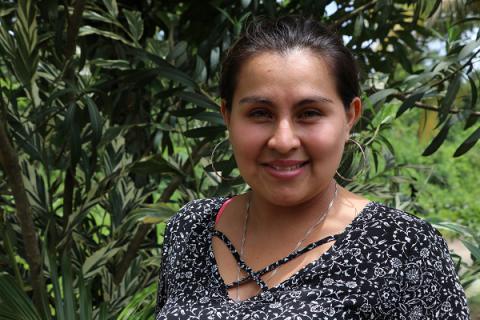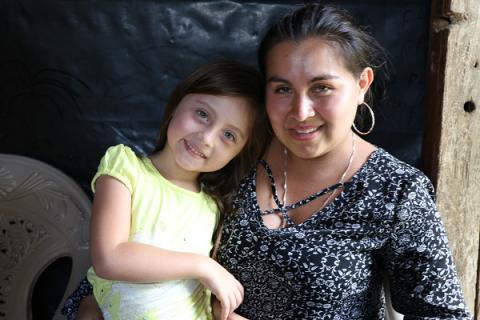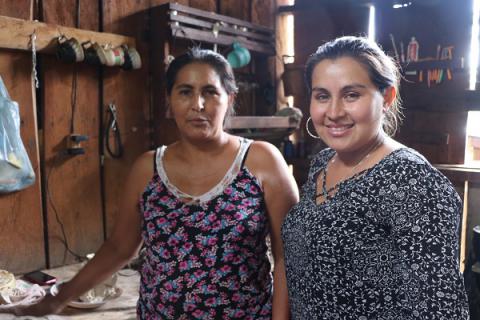 Nicaragua
Nicaragua
Languages
“There’s a market, and if there isn’t, you need to create one”
It is almost eleven o’clock in the morning when we arrive at the El Galope community, located in the El Cuá municipality of the Jinotega Department, some 217 km from Managua. In a house built of wooden boards, with sheets of plastic serving as divisions between the rooms, a 25-year-old woman awaits us. Francis Ocampo is one of the 535 adolescents and young women and men from the Jinotega and Matagalpa departments who are taking part in the “Cup of Excellence with Young Entrepreneurs” project that is being promoted by Save the Children, with financing from the Keurig Green Mountain-Judith Haskell Brewer Fund and the Bezos Foundation.

In the framework of the project, Francis has not only begun an innovative business in her community, which we’ll talk about in a moment, but also leads a group of 8 adolescents and young people who meet regularly to talk about different topics, like coffee production, entrepreneurship and employability, life skills, and even sexuality. “They are like field schools,” she tells us confidently, “and I am the promoter and I lead different training programs about important topics. First I receive the training, and then I replicate it with my group. Part of it is theoretical, and the other part practical.” When we ask about how the group receives training, she tells us that they love the practical part, and above all topics related to coffee. “About two weeks ago, I asked a farmer to lend us some land to teach about coffee diseases, and we conducted a diagnostic and they loved it, because it’s something they know about.”
We spoke with Francis about the challenges of leading this type of group, given that there are certain topics that she is more comfortable with than others, and the fact that some are hard to deal with given the context she’s working in. “In rural areas, it is hard to talk about certain things because they’re considered taboo, but we don’t talk about anything really unusual, just about natural things,” she explains. Nonetheless, this young woman says that it’s been hard to talk about sexuality, “since many young people come from very religious families and they get embarrassed, so I try to gain their trust and tell them that it’s something natural, part of human life.” Francis is aware of how much she enjoys helping the adolescents and young people she works with.
Skills for life are essential
One of the last training sessions she took part in and then replicated with her group is about creating a life plan. “We talked in the group about what people are thinking about changing and what they want to do with their lives. This is very much related to our culture, who they are and who they want to be,” she explains, and she admits that she’s also been affected by this process of self-reflection. “I had asked myself these questions. I don’t want to just stay where I am, I want to reach further, and if I fall down in the process, I will pick myself up again.”
Francis believes that the topic of skills for life is important. “It has led me to train more, and made me think, because it has to do with the way I analyze myself, my personality.” She adds that she likes everything that she is learning in the training programs promoted by La Cuculmeca, one of Save the Children’s partner organizations in the project, because each module provides her with something.
“Everything we are seeing has something to do with my studies,” affirms Francis, who tells us that she is in her last year of studying law, and that she is specializing in Family Law. “In the training, we have been learning about human rights, equality, children’s rights… the project has a lot to do with my studies, my life, and everything.” She is also very clear about her future plans. “I want to turn my life in another direction. I don’t want to just be here. In the future, I want to open my office here, and provide services 2 or 3 days per week, and the rest of the time I want to be in El Cuá, in Jinotega, wherever I need to be.
Beginning an innovative business
After talking about her role as a promoter and how she organizes the training sessions, we ask about her business, which she shares with her brother. “For two months, we have had a weeder/mower that is used for agricultural activities, to clear and weed pastures, coffee farms, cornfields…” she explains, and she also mentions that their new service is beginning to show results thanks to the project and support from La Cuculmeca. “A friend of ours first came up with the idea, and I decided to make it happen. Now we provide a service to the community that no one else can do.” She explains that clearing a piece of land, which used to take weeks when done manually, can now be done with the machine in 2 days.
“Now we are advertising, because people don’t know about our service yet, we’re the first to provide it,” she comments, and when we ask about the machine, she assures us that “I have tried it myself”. We want to see where she keeps it to take a photo, but she smiles and explains, “today my brother is using it, because they are clearing a cornfield.” Even though it is just beginning, the business seems to be starting off on the right foot.
Their advertising, although limited so far, is already showing results. “We talk with producers, we earn their trust so they know what we do. The people we have worked with are very satisfied,” she comments.

During our conversation, Francis’s 5-year-old daughter Nohemi, who attends preschool, watches us with curiosity. “We want to go to the parent meetings at the school to tell people about our land clearing and weeding service,” she adds. She knows they need to go to the places where the community usually meets to publicize their work, and the school is one such place.
Saving their earnings
“We’ve now cleared cornfields, bean fields and coffee farms. We charge by the area cleared. For one manzana, the cost is C$900.00, depending on the type of weeds and growth we’re clearing. For each manzana, we are left with C$600.00 after covering indirect costs like gasoline and paying the person who operates the machine, she explains, and she tells us that they’ve already earned C$1,500.00. She says her brother is the one who does the bookkeeping.
“We are saving what we earn to insure that we can keep the machine in good shape, and for other activities,” and she tells us that they have formed a community savings group among her group, and project participants in El Cuá have formed another one. “We each put a minimum of C$50.00 per month into a savings box.” They meet with the “board of directors,” which is made up of three people who have the key to the box and make the deposits. They are thinking of going one step further and “forming a cooperative among all members of the group, to avoid selling to intermediaries and thereby increasing their earnings.”
While she pats out tortillas in the kitchen, Francis’s mother, doña María Concepción, says that she is happy about what her children are doing. “It’s good that they work together and form a cooperative, it’s good for everybody. They have many abilities, and they can achieve even more. I’m very proud.”

The family also has a plot of land where they grow coffee and are using the techniques they have learned about bio-fertilizers, and managing and controlling shade and humidity to avoid diseases in their plants. “Before, we used chemicals, but not now. Now we work with what we make ourselves,” comments Francis.
Although the project will conclude in November, and Francis and her brother are the only young entrepreneurs participating from the El Galope community, they are committed to making their business grow. “Our idea is to keep going with the business. It doesn’t matter if the project is leaving, we want to keep it going. There is a market, and if there isn’t, we will create one,” she affirms confidently. Francis is always thinking about going the extra mile. “I want to open up new directions.”